 NUMBER: 57
NUMBER: 57TITLE: My Freshman Year: What a Professor Learned by Becoming a Student
AUTHOR: Rebekah Nathan
STARTED: July 13, 2006
FINISHED: July 15, 2006
PAGES: 186
GENRE: Education
FIRST SENTENCE: The idea for doiung this research really gelled after I audited a couple of courses for my own continuing interest and education.
SUMMARY: [From barnesandnoble.com] In her mid-fifties, the author (Rebekah Nathan is a pseudonym) registered as a freshman and moved into a dorm, concealing her identity as an anthropology professor on leave from the very same state university (identified as "Any U"). Her intent: to use her expertise in ethnographic fieldwork to better understand today's undergraduates. Only a few administrators were in on her project. Nathan undertook both participant-observer research and formal data collection via interviews. She always identified herself as a researcher and found it remarkable that students did not probe her further, as she had a strict policy of "tell if they ask." Her research brought forth three defining aspects of student life-choice, individualism, and materialism-and found that university efforts to build community among the freshmen were largely unsuccessful. In addition, the author learned why many students find cheating an acceptable response to managing tight schedules and gained insights into the nature of the informal conversations students have about their professors and courses. In the end, she offers a good understanding of the current generation of college students and the broader culture from which they have emerged.
REASON FOR READING: I read a review of the book a few months ago and was intrigued.
THOUGHTS: I think Nathan hit everything right on the head. Despite her own misgivings and worries about her research methods, I think she has accurately portrayed life as a college student. This was a fantastic read, not only because I could recognize many of her arguments and findings, but also because it allowed me to think more critically about my own time in college.
I found it interesting that Nathan spent much of her time simply watching how people interacted. Her student seems to show that like tends toward like. I would have to agree. This goes for everything from friend groups, the study habits, to seating patterns. In her work, Nathan did not critique or offer solutions, she merely makes observations. This method leaves many doors open to those who read the book. I believe this is where the strength of her findings lie. Students, administrators, and professors alike can take Nathan's research and use it in many ways.
As a former student, I saw myself agreeing with the majority of Nathan's findings and using that information to reflect on my own college experience. The areas where I found myself disagreeing the most with Nathan was on her reflections of how students act in the classroom. While most of her observations rang true through my own experience, she seemed to lack an example from an Honors class. This is where her experience and my experience differ the most. I found myself wishing she had spent more time exploring the difference between Honors courses and the general courses offered. I feel her book would be more rounded and complete if she had.
What I found most pleasing about reading this work was that it was narrative. She told stories. There were moments of statistics and the like, but the book was composed like a journal. Because she formatted the book in this way, it was easy and enjoyable to read. Her logical structure for her findings also made her observations easy to follow and understand.
I would highly recommend this book to anyone who has thought critically about the world of college academics and culture. It was an intriguing read; one that creates more questions than it answers.
MISCELLANEOUS: I wonder if she did this project at a school where I have friends.
KEEP/SHARE/CRINGE(?): It's going back to the library. I swiped it before it even hit the stacks.
RATING: 7/10 [Very Good]
CR: Believe by Victoria Alexander
RN: Deception Point by Dan Brown or another romance novel.

Comments
btw, this is what a qualitative research class at an Ivy League school gets you - picking apart the blog entries of your friends. i'm sorry.
See, learning does continue after school.
Also, is this where I say. "My baby's growing up to be all ivy league smart." *sniffle*?